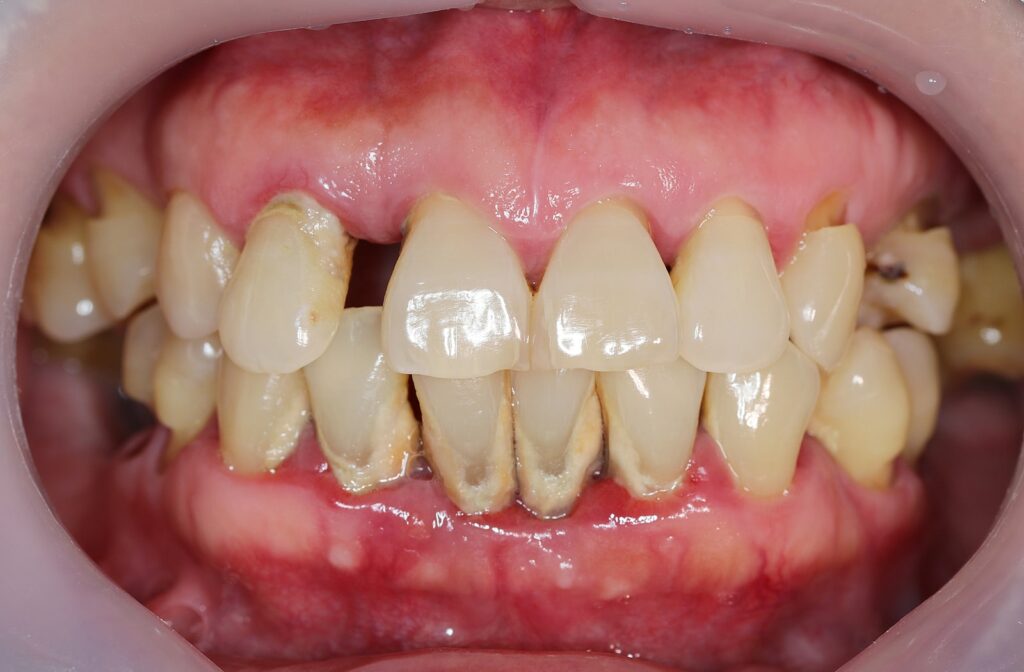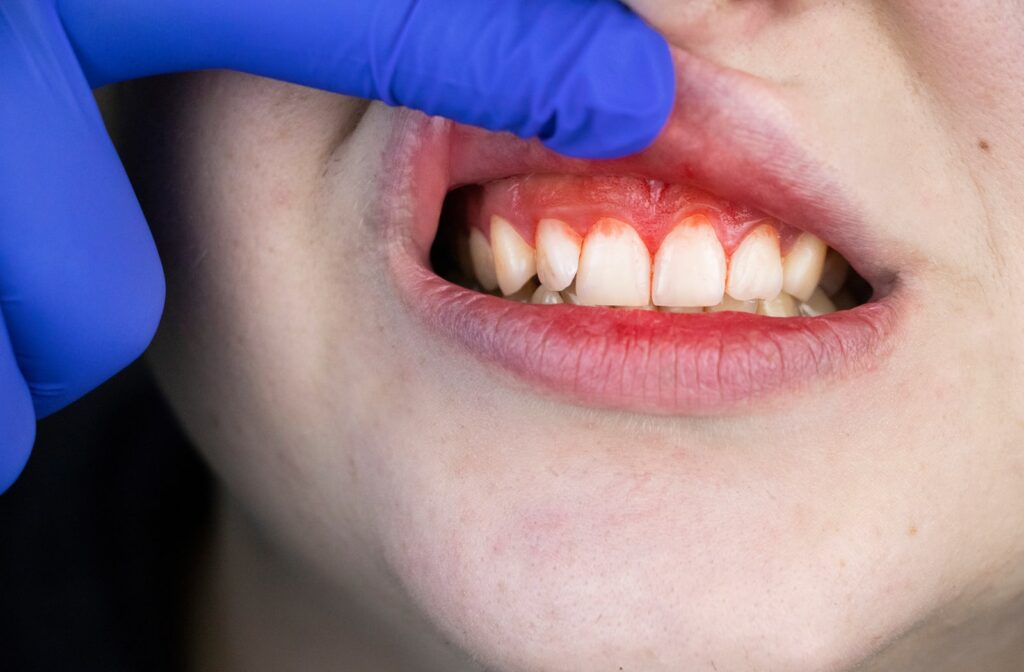Proper oral hygiene habits not only ensure your smile stays bright and healthy, but it can also help lower your risk of developing gum issues such as gingivitis and periodontitis.
Maintaining a proper oral hygiene routine and seeing your dentist for regular check-ups and cleanings is important to remove the plaque build-up that can damage your teeth and gums.
At Arch Dental, we can help you keep your mouth healthy, and in the case of gum disease, we offer a number of treatments to help! Don’t let gum disease get in the way of living a happy and healthy life. Keep reading to learn more about gingivitis and periodontal disease, and what you can do to avoid developing gum disease.
What is Gingivitis?
Gingivitis is a mild form of gum disease resulting in inflamed and irritated gums.
This type of gum disease occurs when too much plaque builds up in the areas between the teeth, causing swelling. While gingivitis can be uncomfortable, it is typically reversible. Unfortunately, if left untreated, gingivitis can progress to more serious oral issues, such as periodontitis.
How Do I Know If I Have Gingivitis?
If you have gingivitis, it’s important to get it looked at by a dentist before it has the chance to progress. If you have any of the following symptoms, book an appointment with your dentist as soon as possible:
- Swollen gums
- Red or discolored gums
- Gums that bleed easily when you brush or floss
- Bad breath
- Receding gums
- Painful gums
What Causes Gingivitis?
Gingivitis can be caused by a number of factors, but you may have an increased risk if any of the following apply to you.
Smoking
Smoking is associated with being a risk factor for developing gum disease. Additionally, if you smoke it decreases the chances that gum disease treatment will be effective.
Poor Oral Hygiene
Proper oral hygiene is essential for keeping your mouth healthy. Because gingivitis is caused by plaque build-up, not brushing or flossing regularly can lead to its development.
Hormonal Changes
When your hormones change it can increase the chances of your gums becoming sensitive or inflamed. Be sure to take extra care of your teeth or gums if you’re experiencing hormonal changes, including puberty, pregnancy, or menopause.
Poor Diet
Just like any other aspect of your health, your oral health is greatly affected by nutrition. To make it easier for your body to fight off gum disease, it’s important to maintain a healthy and balanced diet full of the proper vitamins and minerals your body needs.
Chronic disease
Some chronic diseases, such as diabetes, HIV, or cancer can affect how easily your body is able to fight off infection. If you suffer from a chronic disease, your dentist can help you build an effective oral hygiene routine to reduce your risk of developing gingivitis and other gum diseases.
How is Gingivitis Treated?
If you have gingivitis, it’s important to get prompt and effective treatment. With quick treatment, gingivitis is reversible and you can avoid more serious oral issues.
At Arch Dental we offer a number of options to treat gingivitis.
Professional Dental Cleaning
The first step to getting rid of gingivitis is to receive a professional dental cleaning. A dental cleaning involves a dental hygienist removing plaque, tartar, and bacteria from your mouth, which helps to lower inflammation and discourage future plaque buildup.
Dental Restoration
During a dental exam, your dentist will check to see if your gingivitis is caused by misaligned teeth or poorly fitted dental restorations, such as crowns or bridges. These can cause gum irritation or make it harder to remove plaque during daily oral care.
If this is the case, your dentist will likely recommend fixing these problems in order to avoid developing gingivitis in the future.
Proper Oral Care
While gingivitis can usually be treated through one cleaning, your dentist will go over how to avoid developing gingivitis again in the future.
To take proper care of your teeth and avoid developing oral issues, follow a proper oral hygiene routine at home, and see your dentist for regular checkups and cleanings at least twice a year.

What is Periodontitis?
Periodontitis is a more serious form of gum disease that occurs when gingivitis is left untreated for too long.
If you have periodontitis, your gums will begin to recede, leaving pockets in your gums where plaque can continue to spread and grow, leading to tooth and bone loss.
How Do I Know If I Have Periodontitis?
If you have periodontitis, you may notice any of the following symptoms:
- Swollen gums
- Bright red or purple gums
- Painful gums when touched or when chewing
- Gums that bleed easily after brushing & flossing
- Bad breath
- Pus between your teeth and gums
- Loose teeth
- Spaces developing between your teeth
- Receding gums
- A change in your bite
If you have any of the above symptoms, make an appointment to see your dentist right away. Early treatment can minimize damage and reduce the chances of tooth loss.
How Is Periodontitis Treated?
Depending on the severity of your periodontitis, your dentist may recommend a number of treatment options.
Professional Dental Cleaning
The first step in treating periodontitis is getting a proper dental cleaning. During your cleaning, a dental hygienist will remove the plaque, tartar, and bacteria buildup causing your gum disease.
While the average patient receives a cleaning every 6 months, if you have periodontitis, your dentist may recommend more frequent visits.
Scaling and Root Planing
If your periodontitis is caught early enough, your dentist may recommend scaling and root planing. Scaling and root planing is a deep cleaning that goes beyond regular dental cleaning.
During this procedure, plaque and tartar are scraped away, while rough spots on the tooth root are made smooth with planing. This can help discourage plaque buildup in the future.
Surgery
If you have an advanced case of periodontitis, surgery may be necessary. During surgery, your surgeon will lift your gums back to remove hard-to-reach tartar, and adjust them to reduce the space between your gums and teeth.
Soft tissue grafts may also be performed to fill in places where your gums have receded.
Bone Grafts
If any of your bones have been damaged by periodontitis, you may need a bone graft to replace them.
Bone grafts use fragments of your bone to replace damaged bone, which can promote future bone growth while helping your teeth to become more stable.
Protect Your Mouth from Gum Disease
At Arch Dental, our team is here to help you achieve an excellent smile, and having an excellent smile starts with healthy gums.
Book your next appointment with us today to experience what we can do for you!


